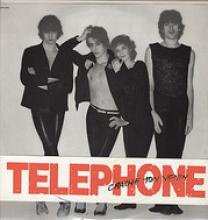Belgium might be the most consistent in cranking out groups – the Kids remaining one of the greatest punk bands of all time. But that band was partial to the King’s English. Anyway, holding a listener’s interest arrives two fold. Firstly, a band needs some sort of melodic hook – in punk at least. It might be all too simple and dumbed down for the general public, but it’s gotta be there. Secondly, though, it’s always a bonus when one can sing along. And for the most part, bands stick to its native land’s tongue while performing. The Ex are a notable exception. But that band’s made up of weirdo anarchists and as likely to play funk as sound like a Subhumans’ styled group.
Regardless of that, the best groups – or Plastic Bertrand even – are able to capture the imaginations of listeners with sultry nonsense and a bit of perversion in any language. The first part is applicable to France’s Telephone.
The group was active during the latter portion of the seventies and worked a few years into the eighties releasing albums with increasingly troublesome artwork. So while the band began as some mélange of punk, new wave nerviness and classic rock, to gander at those covers from the eighties it would be easy to guess that the group devolved into something less than great.
Only being able to track down the ensemble’s second long player - Crache Ton Venin, which was released in 1979 – grants listeners a look into a band’s career part way figured. It was surprising enough to locate this slab, so hunting down its predecessor seems like something beyond the realm of possibility. All involved should keep their eyes open…
Anyway, Telephone’s second disc, comprised of ten French language tracks, finds Jean-Louis Aubert (singer and guitar), Louis Bertignac (singer and guitar), Corine Marienneau (baser and singer) and Richard Kolinka (drums) working through its vast influences.
As already mentioned, these folks fence sit most of the time, with even its most aggressive tracks including a bit of schmaltz for the radio audiences interested in punk during the late ‘70s. “J'sais pas quoi faire" gets as nasty as any other power pop track of the era, but there’s a bit of cowbell inserted there for some G-d unknown reason. And while this offering, specifically, shows off the band’s chops, there might be too much sweetness here for the spikey haired crowd.
It’d be easy to guess that the band had a decent run as it opened for the Rolling Stones not just in France, but in the States and Japan. The onset of the eighties, though promising for the likes of Blondie, the Clash and the Talking Heads who were able to turn rebellion into profit, even as it led to the dissolution of not just Telephone, but all of those one time upstarts.
